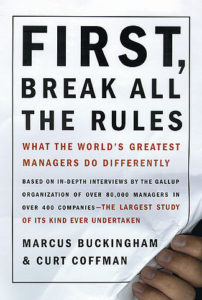
Management philosophy at Facebook is heavily influenced by the research done by Gallup, all the way from how Pulse surveys are conducted to how managers are coached. There’s a lot of unconventional wisdom in this book, which makes it interesting and high signal. Here are the parts that I found helpful:
- The catalyst role describes what great managers do.
- You can not infer excellence from studying failure and then inverting it. Excellence is not the opposite of failure. The best way to investigate excellence is simply to spend a great deal of time with your top performers.
- Managers do things right. Leaders do the right things. The most important difference between a great manager and a great leader is one of focus. Great managers look inward. They look inside the company, into each individual, into the differences in style, goals, needs and motivations of each person. Great leaders, by contrast, look outward. They look out at the competition, out at the the future, out at alternative routes forward … They must be visionaries, strategic thinkers, activators.
- Define outcomes rather than methods: To focus people on performance, one must define the right outcomes and stick to those outcomes religiously. The hardest thing about being a manager is realizing that your people will not do things the way that you would. Define the right outcomes and then let each person find his or her own route.
- A company’s mission should remain constant, providing meaning and focus for generations of employees. A company’s strategy is simply the most effective way to execute the mission. It should change according to the demands of the business climate.
On talent:
- Play to people’s strengths, don’t try to fix weaknesses: People don’t change that much. Don’t waste time trying to put int what was left out. Try to draw out what was left in. That is hard enough. Identify a person’s strengths. Define outcomes that play to those strengths. Spend most of your time with your best people.
- Talents cannot be taught. A person’s drive is not changeable. A manager can never breathe motivational life into someone else. No manager can make an employee productive. They can help the employee find the path of least resistance toward his goals. They can help the employee plan his career.
- A non talent becomes a weakness when you find yourself in a role where success depends on your excelling in an area that is non talent.
On performance:
- The manager’s responsibility is to steer the employee toward roles where the employee has the greatest chance of success.
- What level of performance is unacceptable? Any level that hovers around average with no trend upward.
- How to fix bad performance: 1) Devise a support system 2) Find a complementary partner 3) Find an alternative role
It was really interesting to read about best housekeepers, best nurses and best salespeople and what makes them special. Overall, I find this book as a great resource for new managers, as it provides a framework and unconventional wisdom to approach people management.
